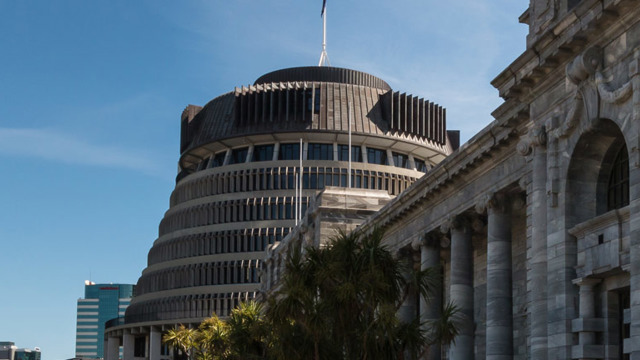Matter of opinion
Through a Looking Glass, Darkly
New Zealand's rules for political donations – why targeted changes for 2023 should be welcomed
How political parties and candidates are funded, and the rules that apply, are essential to any functioning democracy. Even suspicion of improper influence can greatly reduce public participation and engagement. The consequences of low trust in the institutions of government are only too starkly seen in Europe where low vaccination and high death rates match those countries with the lowest ratings for trust in government.
Although New Zealand performs well in the OECD trust in government statistics, recent incidents involving skirting, if not breaching, electoral funding rules by parties and politicians, while not endemic, should be a cause of concern. It is also a concern that, under the current framework, over two-thirds of the nearly $7 million in donations over the last election was received from undisclosed donors, placing us increasingly out of step with other jurisdictions that more rigorously restrict or ban this type of political support.
Issues with the current regime include the differing thresholds for anonymous donations ($15,000 for parties, while only $1500 for candidates), rules that encourage the practice of splitting larger donations to keep within anonymity or reporting thresholds, and the limited ability to scrutinise associations between donors among other things.
For this reason, the independent review of New Zealand's electoral laws announced in September was timely. As are the targeted changes that the Government is considering for implementation before the 2023 election, and which opened for feedback on 3 December 2021 (closing 22 January 2022).
These targeted proposals are intended to increase transparency and, through improved reporting, better inform broader reforms under consideration for the 2026 election such as: public funding of parties; the length of electoral terms; Te Tiriti o Waitangi obligations; restrictions based on who is donating (eg corporations, unions); among other things.
Targeted changes under consideration for the 2023 election
The key change for donors is that, to remain anonymous, any donation to a party must be under $1,500 rather than $15,000 which is the current limit. This brings the anonymous donation threshold in line with donations for candidates and avoids incentives to use the party option to donate to a candidate. A person supporting a candidate will no longer be able to provide support by way of a loan without this being disclosed.
For parties and candidates, there will be more regular reporting (3 or 4 times a year rather than annually, to improve the timeliness of information), and requirements to provide details of amounts and volume of all donation under $1500 (rather than just anonymous donations). Other proposals include more detailed disclosures around in-kind donations, and clearer rules around auctions and fundraising.
Separately, the Government is proposing targeted rule changes to allow changes between the Māori Electoral Roll and the General Roll to coincide with the electoral terms of three years – currently, those wanting to move between rolls can only do so every five or six years, in line with the census.
Anonymous donations – should they be banned?
A primary focus of the proposed changes is anonymous donations with consideration also being given to banning this category of donations altogether. Critically, the proposed changes, or even a ban, would not impact on an existing formal mechanism which enables anonymous donations to be made through the Electoral Commission up to the value of $49,000, but is rarely used.
The argument for anonymous donations is to preserve freedom of political expression by allowing donations while protecting privacy. The countervailing consideration is transparency around improper influence, and perceptions of improper influence.
Overseas, the argument in favour of anonymity is increasingly carrying less weight, with anonymous donations effectively banned in many other OECD jurisdictions (Canada sets the threshold at $200, and Ireland at just €100).
The public interest in restricting or banning the current anonymous donation rules is strong because, while anonymous to the public, in practice, the donor is often known to the recipient. It means there is little way of knowing who has the ear, and as Professor Andrew Geddis put it, the "gratitude" of our political decision-makers and no way of holding politicians to account about who they might be influenced by. The fact that the more formal Electoral Commission process for anonymous donations is infrequently used suggests these softer anonymous donations rules might be preferred precisely because they can be more easily skirted. The risk is that this apparent anonymity, becomes viewed as an acceptable practice (if it hasn't already).
Overall, the proposed tightening of the rules for 2023 is more than technical tweaking. The proposed changes will make it harder to split donations to avoid disclosure requirements, remove channelling mechanisms used to obfuscate candidate donors, and provide invaluable information for the wider review. It leaves less room for speculation and suspicion and, accordingly, less room for erosion of trust and participation in our political processes.
The looking glass should give us a truer reflection of who we are as a democratic polity after these reforms.



